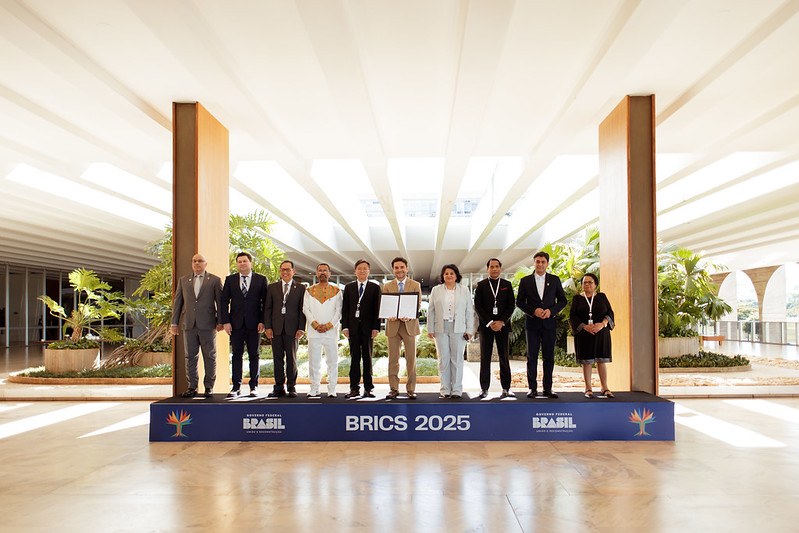Digital nomadism and sustainable tourism are key highlights of the Cerrado Declaration
On Monday (12), at the Itamaraty Palace in Brasilia, BRICS Tourism ministers approved a joint declaration recognizing tourism as a strategic tool for economic growth, cultural preservation, and sustainable development in the Global South.

Por Franciéli Barcellos de Moraes / francieli.moraes@presidencia.gov.br
In 2024, the tourism sector generated approximately USD 11 trillion in revenue, accounting for 10% of the global Gross Domestic Product (GDP), and supported around 348 million jobs—equivalent to the entire population of 29 cities the size of São Paulo working in the sector. Data from the World Travel and Tourism Council (WTTC) highlights the growing relevance of tourism on the international agenda, particularly from the perspective of the BRICS countries. In the Global South, tourism is seen as a strategic tool for promoting economic growth, preserving cultural heritage, and advancing sustainable development.
On Monday (12), BRICS ministers and high-level tourism authorities approved the Cerrado Declaration, identifying six key areas for cooperation among member countries: infrastructure, diversification of tourism offerings, professional training, public-private collaboration, financing and incentives, and tourism promotion.
“Let us work together—governments, businesspeople, political leaders, and local communities—to ensure that tourism plays a key role in addressing global challenges and promoting peace, solidarity, and social justice, while generating prosperity and better living conditions for people across the planet,” said Celso Sabino, Brasil’s Minister of Tourism and coordinator of the initiative.
The Cerrado Declaration can be read in full here.
Strengthening tourism in small towns and communities from an international perspective
SOUTH AFRICA — According to Maggie Sotyu, Deputy Minister of Tourism of the Republic of South Africa, the government is partnering with municipalities to empower local communities, with a particular focus on small and medium-sized enterprises (SMEs). The strategy involves bringing entrepreneurs together—especially in rural areas—to establish direct communication channels and listen to their needs and suggestions. The Deputy Minister emphasized that the support will be sustainable, going beyond simply transferring resources. It will include ongoing monitoring of fund usage and enterprise management to ensure development is both effective and lasting.
“For instance, we try to secure funding for skills development and then train young people, particularly in hospitality and culinary arts,” Sotyu added. “We work closely with the private sector to ensure they find jobs or are supported in starting their own businesses.”
UNITED ARAB EMIRATES — Secretary of the UAE Ministry of Economy Abdelrahman Hassan Almuain stated that the tourism industry is one of the fundamental pillars of job creation in the federation, contributing more than 12% to the national GDP. He emphasized that strengthening the sector—particularly the hotel industry—has a direct impact on employment, as it increases demand for professionals in areas such as lodging, food services, and tourism infrastructure.
“Hosting the 28th United Nations Climate Change Conference (COP28) was one of the reasons we became more sustainable, so we are committed to ensuring that all tourism-related activities support sustainability,” he said. “Here, we see that the Brazilian government has several initiatives to protect and promote tourism in the Amazon, and we are pursuing similar efforts. We need to protect the environment, ensure sustainability, and then promote tourism.”
RUSSIA — According to Nikita Kondratyev, Director General for Tourism of the Russian Federation, the government is committed to integrating regional budgets into the federal system to support tourism management by Indigenous peoples and small communities, thereby contributing to job creation. Kondratyev also emphasized ongoing efforts to strengthen small and medium-sized tourism-related businesses to boost the sector. These initiatives form part of a national tourism development project aimed at improving infrastructure and promoting the sustainable growth of small towns.
“When we talk about investing in roads and infrastructure, for instance, we are primarily talking about small towns,” said Kondratyev. “Big cities generally do not face the same challenges, but every country struggles with smaller municipalities. That is why we are prioritizing funding and supporting investment in these areas.”
Digital and inclusive tourism
In 2023, there were 35 million digital nomads — people who work remotely while traveling — and estimates suggest that number could reach 1 billion within the next ten years. These figures come from a global report by Fragomen, a company specializing in migration. The report, titled A Report on Strategies for Digital Nomads, was the main output of a working group that focused on four dimensions: mapping destinations, visa policies, infrastructure and services, and promotion efforts.
The report emphasizes that efficient connectivity, safety, and leisure opportunities are essential to attract this niche audience. It highlights destinations such as Brasil, Ethiopia, the United Arab Emirates, and India as examples for other countries to follow. The conclusion underscores that coordinated action in the coming years will be crucial to leveraging digital nomad tourism as a catalyst for inclusive and resilient economic growth across BRICS nations.
Sustainable tourism
Another report focuses on Sustainable, Resilient, and Regenerative Tourism, positioning tourism as a vital driver of economic, social, and environmental progress within the BRICS. It offers a comparative analysis of national strategies to identify good practices and common challenges. The study emphasizes the importance of knowledge exchange and collaborative solutions to strengthen the sector’s capacity to respond to global challenges, including climate change and economic instability. The Sustainable Travel Report published by the Booking platform notes that, as of 2023, 76% of travelers have set a goal to travel more sustainably in the coming years.